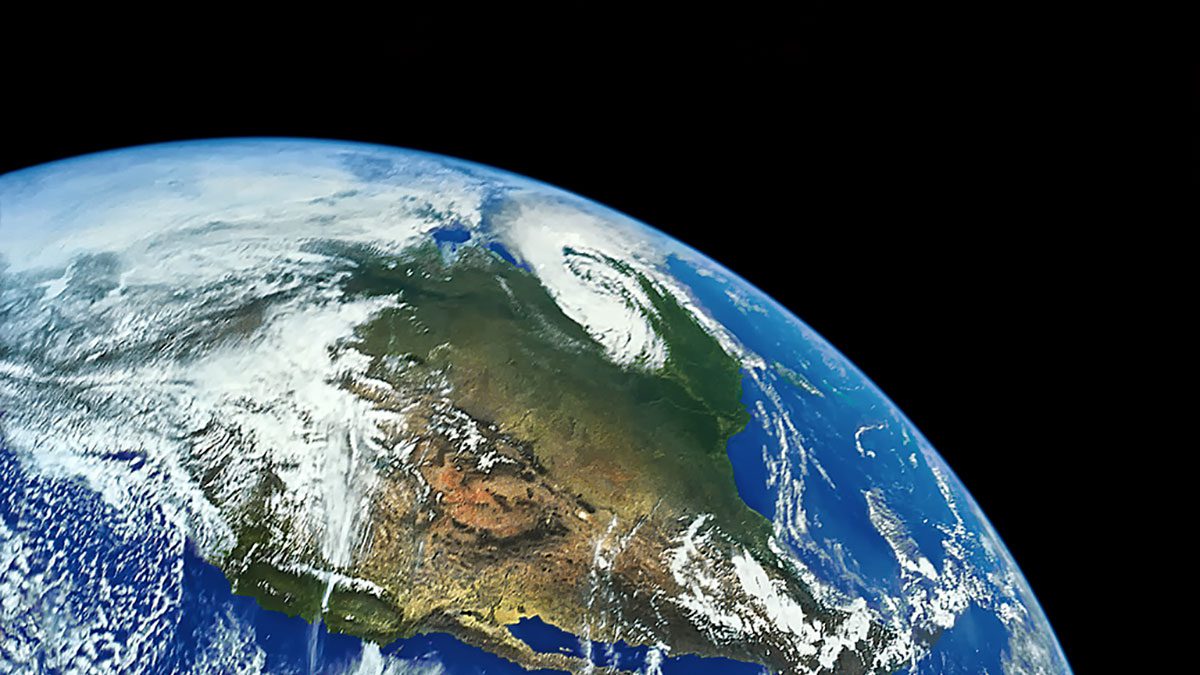There was an interesting discussion recently on the Quora website. It’s about what Earth looks like from space and the impact that seeing Earth from space has on the thoughts and feelings of astronauts. This ‘overview effect’ – Paul Love explains — is ‘a shift in the way many astronauts see the planet, literally and figuratively, as well as humanity and human culture and society.’
They see the Earth as a ball floating in space, unanchored to anything. Fragile is a word they often use to describe what it looks like. They also note how incredibly thin the atmosphere is (relative to the Earth). These sights often make astronauts feel more strongly about protecting the Earth and the atmosphere to keep it habitable for humans.
Another part of the overview effect is seeing the Earth’s landmasses without geopolitical borders — without the false barriers we see on maps that indicate where people who are ‘different’ from you live. This gives the astronauts a greater feeling of the human race being a single, united race rather than in terms of, for example, American and Russian.
Amazingly, the overview effect tends to stay with them as a permanent shift, even long after they’ve returned to Earth. And in the meantime, it seems most people still see things in terms of resources to be exploited instead of protected and petty political/national differences. I’d imagine this is frustrating to the astronauts who have felt the overview effect.
Note that you don’t have to see the Earth in its totality to get the effect, as the Apollo astronauts did when they were over 200,000 miles away from the planet. Even astronauts in low-Earth orbit, who are far enough away to see the Earth as a giant ball, but not far enough to see all of it at once, get the effect.
Paul Love
See, for instance, the photo that illustrates this post, showing the state of Florida from space.
In fact, the International Space Station (ISS) has a room called the cupola, which has a small dome of 360-degree panoramic windows pointing directly down at Earth. It’s a spectacular view I wish I could see someday.
Most of us will never have that chance, but we can simulate the experience with the help of photography and film. Watch this video, in which astronauts Drew Morgan and Luca Parmitano take us on a ‘grand tour’ of the space station (January 2020).
You develop an instant global consciousness, a people orientation, an intense dissatisfaction with the state of the world, and a compulsion to do something about it. From out there on the moon, international politics look so petty. You want to grab a politician by the scruff of the neck and drag him a quarter of a million miles out and say, ‘Look at that, you son of a bitch.’
Astronaut Edgar Mitchell (Apollo 14)
Remarks contributed by two other Quora participants are of special interest.
It doesn’t take a rocket ship to see the Earth as it is. Whenever I take a trip out of the city, across the vast landscape of America, I imagine myself as a little bug moving across a big ball, and try to tune into my position on the planet and its position in relation to the moon and other planets in the solar system. All by myself out on the Great Plains I get the same feelings the astronauts get. So you don’t have to go to the Moon; all you have to do is take a road trip through Utah.
Richard Feller
It’s not only how ‘incredibly thin the atmosphere is’ … but also that humanity relies on an even thinner layer of about 10 cm (4 inches) of dirt plastered over much (but a long, long way from all) of the Earth’s land masses. Without this fertile layer we would have little to eat and the atmosphere would not contain so much of the oxygen we need to breathe (there would still be some photosynthesis from the oceans). However, we treat our fertile soils even more badly than we do the air.
Simon Quarmby
The Invisible Monster
But why? Why do we treat our precious air and soil, aquifers, streams, and seas as objects of short-term exploitation and dumps for our wastes? Is it only because too many of us fail to appreciate how thin the atmosphere and soil layer are? What impels us to behave in such a destructive and self-destructive manner?
The problem is that Earth and humanity are entangled in the tentacles of a terrible monster. It’s an invisible monster. Even from space you can’t see it. You have to infer its existence from what it does – to nature and to us. We thrash about in distress as it sucks out our life and the life of the natural world. Then it spits out the dry husk of what remains. Its devotees call this ‘progress’ or ‘economic growth’ or ‘conquering new frontiers’; they are not short of inspiring names for it.
Once we are aware of the monster, we can disentangle ourselves from it and organize a new way of life, consistent with the reality of the Earth as seen from space. World socialism. The monster will fade away and vanish. Because the monster – capitalism – consists of nothing but our own human powers that have become alienated from us.



